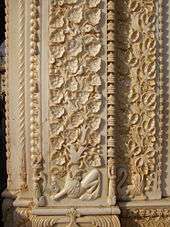Deshnoke
| Deshnoke Deshano | |
|---|---|
| town | |
 Deshnoke  Deshnoke Location in Rajasthan, India | |
| Coordinates: 27°47′28″N 73°20′28″E / 27.791°N 73.341°ECoordinates: 27°47′28″N 73°20′28″E / 27.791°N 73.341°E | |
| Country |
|
| State | Rajasthan |
| District | Bikaner |
| Founded by | Karni Mata |
| Government | |
| • Type | Municipal council |
| • Body | Chairman Kanaram Ghoongharwal |
| Elevation | 265 m (869 ft) |
| Population (2001) | |
| • Total | 15,791 |
| Languages - Marwari | |
| • Official | Hindi |
| Time zone | IST (UTC+5:30) |
| ISO 3166 code | RJ-IN |
Deshnoke (Hindi: देशनोक) is a small town in the Bikaner district of Rajasthan, India, near the Pakistan border and about 30 km from Bikaner.
Deshnoke is famous for its 600-year-old Karni Mata Temple, where rats are worshiped. The goddess Karni Mata has been worshiped by the royal family as well as the general public of Bikaner and other parts of Rajasthan since long ago. They original natives are depawat's of deshnoke known grandsons of karni mata. There are four bramches of depawats- 1.Dungrot 2.Lakhan 3.Siyawat 4.Narsingh
Geography
Deshnoke is located at 27°47′26″N 73°20′27″E / 27.79056°N 73.34083°E. It has an average elevation of 265 meters (869 feet).
Demographics
As of the 2001 Indian census,[1] Deshnoke had a population of 15,791. Males constitute 51% of the population and females 49%. Deshnoke has an average literacy rate of 51%, lower than the national average of 59.5%: male literacy is 60% and, female literacy is 41%. In Deshnoke, 19% of the population is under 6 years of age.
Art
Inhabitants: Since old time Deepawat, Sharma, Jain are living in this town.

Karni Mata Temple
This structure is also known as the Rats' Temple. Located near the Pakistan border, the Karni Mata Temple is a popular tourist destination in the Bikaner region.
Karni Mata also has followers from outside of the state. During Durga Navratri (Dussehra Festival), thousands of devotees visit the temple mainly from Rajasthan and also from Haryana and Madhya Pradesh. Biography of Karni Mata - According to tradition, Karni mata was originally the wife of Kipoji Charan of the village of Sathika. However, she later expressed to her husband her unwillingness to engage in matrimonial relations. He initially humoured her, thinking that she would relent in time. Instead of doing so Karni arranged for him to marry her own younger sister Gulab so that he might have a proper married life. She herself remained celibate all her life, with the concurrence and support of her husband.
Karni lived in her in-laws' village for about two years before leaving with her followers and a herd of cattle to live a nomadic life, camping at sunset. One such camp was made at the village of Jangloo; but a servant of Rao Kanha, who was ruler of the place, denied them access to water for the people and cows. Karni Mata declared her follower Rao Ridmal of Chandasar as new ruler of the village and continued on her journey. When she reached near Deshnok, Rao Kanha himself came to oppose her camping but he died.[clarification needed] Karni Mata stopped further wandering and settled there. Her husband Depoji died in 1454.
In 1453, she gave her blessing to Rao Jodha of Jodhpur for conquering Ajmer, Merta and Mandor. In 1457 she went to Jodhpur at Rao Jodha's request, to lay the cornerstone of the fort at Jodhpur.
Her first temple was constructed in the village of Mathania during her lifetime by her follower Amara Charan. In 1472, she arranged the marriage of Rao Bika (the fifth son of Rao Jodha) and Rang Kunwar (daughter of Rao Shekha of Pungal) to turn the enmity of the Rathor and Bhatian families into friendship. In 1485, she laid the foundation stone of the fort of Bikaner at the request of Rao Bika. In 1538, Karniji went to visit the Maharaja of Jaisalmer. On 21 March of that year she was travelling back to Deshnok with her stepson Poonjar and a few other followers. They were near Gadiyala and Girirajsar of the Kolayat tehsil in Bikaner district where she asked the caravan to stop for water. She disappeared there, reportedly at the age of 151 years.
References
- ↑ "Census of India 2001: Data from the 2001 Census, including cities, villages and towns (Provisional)". Census Commission of India. Archived from the original on 2004-06-16. Retrieved 2008-11-01.